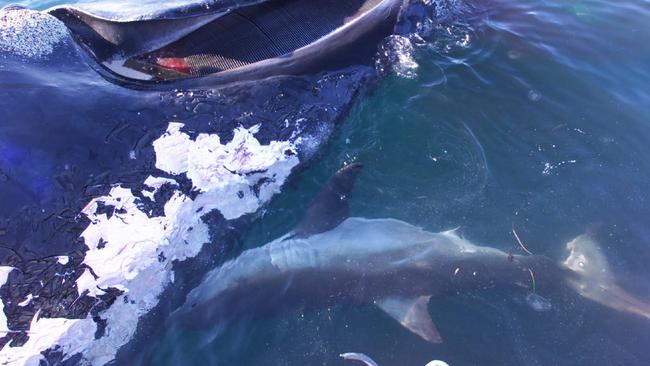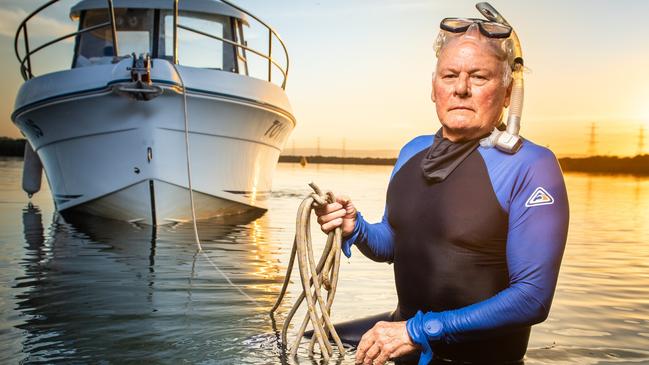Fishers fear ‘flocks’ of white pointers will target distressed, breeding whales caught in toxic algae
New fears of a feeding frenzy have surfaced for whales migrating into toxic waters and with sharks on the prowl.
SA News
Don't miss out on the headlines from SA News. Followed categories will be added to My News.
Fresh fears that algae-affected whales will attract “flocks” of white sharks to beaches have put fishermen and local whale watchers on edge in the Fleurieu Peninsula.
The toxic algae bloom — believed to be caused by the toxic phytoplankton karenia — is implicated in the death of many marine species.
However, the scent of distressed whales and their calves suffering from respiratory illness because of the algae is just what sharks are looking for, one fisherman believes.

Go Get ‘Em Fishing Charters owner Tom Di Vittorio spends much of his time in waters around Victor Harbor and said “if there’s a problem” with the whales, if they’re “distressed and still” then “there will be sharks”.
“We know very well we’ve had whales in before and we’ve had white pointers coming with them, and they haven’t just been dead whales,” he said.
“If the whales are still and there’s a problem, that’s when there will be sharks coming in, and those are very valid concerns.”
In July, 2001, a Southern Right whale carcass at Cape Jervis attracted “flocks of sharks”, and Mr Di Vittorio, along with Victor Harbor fisherman Rod Ness, fear something similar is on the horizon.

Mr Ness said the Southern Right and Humpbacks whales migrate to the region in late May to raise their calves before heading back to Antarctica, and if one died it would be a “feeding frenzy”.
“If you get a dead whale that washes in on the beach, you’re going to have every white pointer in the district there eating it,” he said.
“If you put that into one of our major surf beaches, it is going to be a problem.”
Marine biologist Dr Mike Bossley said he was “cautiously optimistic” that no whales would die to the toxic algae, but if they did sharks wouldn’t be the only worry for beachgoers.
“If a whale does die and wash up it is always a concern for the public if it attracts sharks,” he said.
“But it’s also a concern for the public contracting any disease or illness from the carcass.”
Despite Dr Bossley’s optimism, he said “similar algal blooms” around the world had resulted in marine mammal death, “so it’s not out of the question”.

Elizabeth Steel-Collins, a member of the Encounter Whales conservation group, said the biggest fear for the region was “the unknown”.
“What we’re seeing is unprecedented,” she said.
“This particular algae is not known to be toxic (poisonous) to mammals, or to people, but as an irritant, it can provoke allergy reactions involving the respiratory system, as well as skin and other mucus membranes like eyes.
“As whales are mammals, and immersed in this algal ‘soup’ it’s still a hazard and major concern going into whale breeding season, which will be any day now.
“The underwater world has been affected by the algae bloom, and this includes the whales’ breeding habitat.
“Will it affect the respiratory systems or skin of the whales? We just don’t know. We’ll have to wait, and it’ll be the whales that tell us.”
South Australians have been wading through the sludge of the “algal soup” for nearly two months, the bloom regularly attributed to dead sea life washing up on beaches from Aldinga to Henley Beach, and even on the Yorke Peninsula, since it was first discovered.

Recently, it has forced six oyster farmers at Stansbury to temporarily halt operations for fears of potential contamination.
Though Dr Bossley said the algae had been known to kill sharks, a PIRSA spokeswoman said it was still investigating if the bloom was the cause of a 2.7m great white shark to strand itself on Henley Beach on Monday.
Outside of the fishing industry, some tourism operators in the Fleurieu Peninsula have been left high and dry.
Victor Harbor’s beloved horse drawn tram to was forced to close for three weeks after both staff and horses battled with respiratory issues from the toxic algae.
They have only just resumed their popular trips to Granite Island, but only at a fraction of their usual rate.
General Manager Meg Whibley said the popular tourist attraction was $100k out of pocket from the temporary closure.

“Depending on the wind, sometimes we can still feel the effects of it, so we just have to do half days” she said.
“The horses will get runny eyes or noses, and as soon as that happens, we call it and get them out of there as quickly as we can.
“As much as we get council funding, we are 78 per cent own source revenue, so when we don’t get that extra $100k it’s a big deal.”
PIRSA did not respond to questions about how the algae bloom could impact whales.





